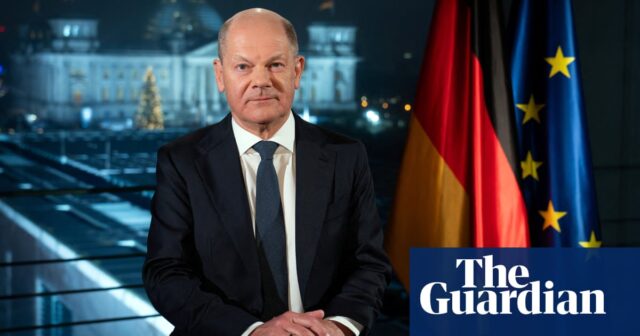The German chancellor, Olaf Scholz, has urged voters not to let the “owners of social media channels” decide next year’s snap election, after Elon Musk repeatedly endorsed the far-right party Alternative für Deutschland (AfD).
In a New Year’s Eve address recorded for television and made available before its broadcast on Tuesday, Scholz said German citizens alone had the power to decide “where Germany goes from here” after the general election on 23 February.
“It will not be decided by the owners of social media channels,” Scholz said of the country’s future.
“In our debates, one can be forgiven for sometimes thinking the more extreme an opinion is, the more attention it will garner.” Rather, Scholz said, the fate of German society “will be up to the vast majority of reasonable and decent people”.
Without mentioning Musk or his platform, X, explicitly, Scholz urged Germans to resist manipulation and to stand up for their democracy.
“After all, it’s customary to make wishes on New Year’s Eve. What I wish for is that we will not let ourselves be played off each other,” he said.
Scholz noted there had been a surge of disinformation on social media after the Christmas market attack in Magdeburg on 20 December in which five people were killed and more than 200 injured. The car ramming was allegedly committed by a Saudi-born assailant with far-right sympathies.
“No small number of these rumours and conjectures, though, have meanwhile been debunked. These things divide and weaken us,” he said. “This is not good for our country.”
On Monday, a spokesperson for Scholz, Christiane Hoffmann, accused Musk of trying to meddle in the country’s election campaign with a series of declarations backing the anti-Muslim, anti-migration AfD party.
“It is indeed the case that Elon Musk is trying to influence the federal election,” Hoffmann said at a regular media briefing. Musk had the right to free speech, she said, adding: “After all, freedom of opinion also covers the greatest nonsense.”
Musk has often weighed in on German politics, even calling Scholz a “fool” on X last month. However, his more recent open calls for German voters to support the AfD, which federal authorities classify as a suspected extremist party, have sparked outrage and accusations of troubling interference in Europe’s top economy.
The South African-born entrepreneur, a close adviser to Donald Trump who has been named by the incoming president to co-lead a commission aimed at reducing the size of the US federal government, wrote on X earlier this month: “Only the AfD can save Germany.”
In the post, Musk shared a video by a German rightwing influencer, Naomi Seibt, who criticised Friedrich Merz, the conservative frontrunner in the German election, and praised Javier Milei, Argentina’s self-styled “anarcho-capitalist” president.
He followed up at the weekend with a guest editorial in the broadsheet Welt am Sonntag arguing that Germany was teetering on the brink of economic and cultural collapse, defending the AfD against accusations of radicalism and praising the party’s approach to the economy, including regulation and tax policy.
The editor of the centre-right newspaper’s opinion section, Eva Marie Kogel, posted on X that she had submitted her resignation in protest at the decision to run the article.
Politicians from across the political spectrum criticised Musk’s attempts to put his thumb on the scales of German democracy, with the health minister, Karl Lauterbach, of Scholz’s Social Democratic party (SPD), calling his intervention “undignified and highly problematic” and Merz saying it was “intrusive and presumptuous”.
Merz told the Funke media group: “I cannot recall in the history of western democracies a comparable case of interference in the election campaign of a friendly country.”
Scholz’s centre-left-led coalition collapsed last month, prompting him to call a confidence vote in order to trigger a general election in February, seven months ahead of schedule. His SPD is widely expected to lose to Merz’s CDU/CSU bloc amid voter anger over the cost of living and meagre economic growth.
AfD members have been working for months to make inroads with the Trump camp, seeking to harness his electoral momentum for the German campaign. Alice Weidel, the party’s co-leader, was one of the first foreign politicians to welcome Trump’s victory.
A small group of AfD activists posed for pictures with Trump at his private club Mar-a-Lago on US election day last month, chanting “Fight! Fight! Fight!” in English and German.
Musk’s endorsement in Die Welt cited Weidel’s “same-sex partner from Sri Lanka” as evidence that the portrayal of the AfD “as rightwing extremist is clearly false”. “Does that sound like Hitler to you? Please!” he wrote.
The AfD is polling second on about 19%, behind the CDU/CSU on 31%. A strong showing for the party could complicate coalition building, requiring the election winner to seek up to two partners to build a ruling majority. All mainstream parties have ruled out collaborating with the AfD at state or federal level.






